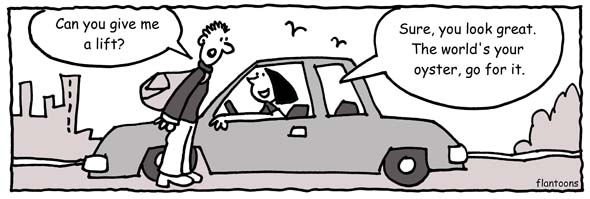
Here’s a list of idioms that all include a type of food, but can you remember which food completes which idiom? When you’ve finished filling them in, see if you can explain what each idiom means. Good luck!
Lesson by Caroline
Read the following short story. Pay attention to the idioms:
Lesson by David, EC London English school

In British slang the word bottle means courage or bravery. So if you have bottle you are brave and are willing to take risks and do dangerous things. Check out these example sentences:
An Agony Aunt is a newspaper writer who answers questions and offers advice on personal problems to people who write in. Take a look at this example letter and then write your own advice. There's also a vocabulary exercise to do.
(Lesson by David, EC London English School)
Dear Abby,
I woke up this morning with a terrible head cold. I’m now writing this lesson in bed surrounded by tissues and orange juice and I’m feeling very sorry for myself! So, why not write a lesson based on illness idioms, I thought...that will make me feel better! In the following idioms, which do you think is the correct missing word?
Lesson by Caroline

Today we take a look at two meanings of the expression, give someone a lift:
Give someone a lift: to provide transportation for someone e.g. take someone somewhere in your car. Give someone a 'ride' is also used:
I have recently moved in with my best friend. As with many close relationships, we speak in a type of code and part of that code is idioms! I’ve made a list of idioms that are used when we are talking about relationships. Can you fit the correct idiom into each sentence? Good luck!
PS: I’d like to point out that sentence 1 is completely fictitious...obviously!
Lesson by Caroline
Match the idioms below with their meanings – write the corresponding number in the gap provided. And then try make your own sentences using the idioms.
This is a follow up to yesterday's Beyonce music lesson. Dreaming and sleeping are both extremely important to me! Here is a list of idioms related to the subject. Can you guess which sentence needs which idiom?
After the success of last week's love idioms exercise, I decided to write another idioms lesson for you based on expressions that contain the verb 'to work'.
I have written the meanings of the expressions at the top and then created some sentences that include the idioms. Can you work out which idiom belongs to each sentence?